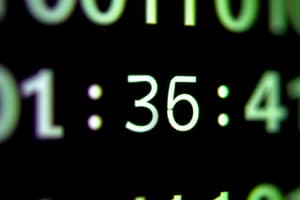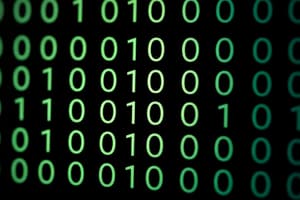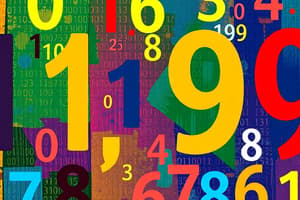Podcast
Questions and Answers
Which number system has two digits, 0 and 1?
Which number system has two digits, 0 and 1?
- Octal System
- Binary System (correct)
- Hexadecimal System
- Decimal System
In the decimal system, how many digits are used?
In the decimal system, how many digits are used?
- Ten (correct)
- Twelve
- Six
- Nine
What is the significance of the rightmost digit in the binary system?
What is the significance of the rightmost digit in the binary system?
- It represents a power of ten
- It represents a power of five
- It represents a power of three
- It represents a power of two (correct)
How does the decimal system differ from the binary system in terms of the range of digits used?
How does the decimal system differ from the binary system in terms of the range of digits used?
What does each position in a number system represent?
What does each position in a number system represent?
Which number system is known for its application in computing and digital electronics?
Which number system is known for its application in computing and digital electronics?
What does '1010' represent in binary and decimal systems?
What does '1010' represent in binary and decimal systems?
How many digits are used in the octal system?
How many digits are used in the octal system?
What is the range of digits used in the hexadecimal system?
What is the range of digits used in the hexadecimal system?
Where did the positional numeral system originate?
Where did the positional numeral system originate?
In which century did Arab mathematicians introduce Arabic numerals into Europe?
In which century did Arab mathematicians introduce Arabic numerals into Europe?
What is a key application of number systems in engineering?
What is a key application of number systems in engineering?
Flashcards are hidden until you start studying
Study Notes
Understanding Number Systems
Numbers are crucial in our daily lives, and we often take them for granted. However, it's essential to understand how different number systems work because they allow us to express numbers accurately and effectively. In this article, I will explore various number systems, their origins, characteristics, and applications.
Representation of Numbers
A number system is used to represent and manipulate numbers using symbols. These symbols can be written or spoken, and they represent quantities or positions within the system. They are based on ordered sets of entities called 'digits', which are used as building blocks. For example, in the decimal system, digits range from 0 to 9, while in binary they only go up to 1.
Common Number Systems
There are several common number systems we use today. Here are some notable ones:
-
Decimal System: This is the most commonly used system worldwide. It uses ten digits ranging from 0 to 9. Each position represents successively larger powers of ten, with the rightmost digit representing a power of one followed by increasingly lower powers of ten going leftward. For example, if you write 740 as 7 x 10^2 + 4 x 10^1 + 0 x 10^0, you get 5740.
-
Binary System: Often referred to as base two, this system has two digits: 0 and 1. Each position represents a power of two, where the rightmost digit corresponds to a power of one, progressing leftwards down to zero. For instance, '1010' in binary means five in decimal because it translates to 8 - 2 - 1 = 5.
-
Octal System: Represented using eight digits, 0 through 7, each place value incrementing by a factor of eight. When converting octal to decimal, multiply each digit by the corresponding power of eight and sum the products. Conversely, when converting decimal to octal, divide the number by eight repeatedly until no quotient remains, writing down each digit obtained during division as the quotient becomes zero.
-
Hexadecimal System: This system uses sixteen digits ranging from 0 to 9 and letters A through F. Each digit represents a power of sixteen, similar to binary and octal systems. Conversion between hexadecimal and decimal involves multiplying each digit by its corresponding power of sixteen and summing the products.
Origins of Number Systems
Number systems evolved over time. Early civilizations developed different methods to represent numbers. The Sumerians were one of the oldest cultures known to have developed a positional numeral system around 3500 BC. Later, Babylonians expanded upon this system and invented the concept of zero. The decimal system originated in India during the Gupta period starting from the fourth century AD. Later, during the 13th century, Arab mathematicians introduced the use of Arabic numerals into Europe via Spain, helping spread the knowledge of these systems globally.
Applications of Number Systems
Number systems play critical roles across various areas. For instance, they are widely used in accounting and finance to record financial transactions or maintain ledger accounts. Science and technology also leverage number systems for measurements like length, mass, time, etc., while engineering uses them extensively in units of measurements, electrical calculations, etc.
Conversion Between Number Systems
Converting between different number systems involves understanding the place values of each system and applying mathematical operations accordingly. For example, converting from decimal to binary requires breaking down the given number into its constituents and writing them in binary form. Similarly, when moving from one base to another (e.g., octal to hexadecimal), we need to understand how many digits are used in that system and then convert those digits one by one.
In conclusion, while we might take numbers for granted, comprehending various number systems helps us appreciate their complexity and versatility. Whether it's keeping track of finances or exploring advanced scientific concepts, understanding these systems allows us to navigate the numerical world more effectively.
Studying That Suits You
Use AI to generate personalized quizzes and flashcards to suit your learning preferences.




